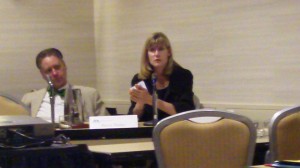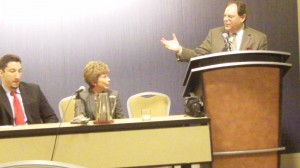A room full of lawyers got a strong message from Dr. Phil McGraw, TV’s family therapist. There is “no safe place for kids anymore,” Dr. Phil told a panel on bullying at the American Bar Association’s Midyear Meeting.
“Kids can’t go to their room to get away from [bullying],” he said in the videotaped address on Friday. “Bullies can still get to them through Facebook and the Internet.”
Dr. Phil said the victims of bullying need help. “We need all hands on deck,” he said. “This needs to be addressed and this needs to be addressed now.”
Other panelists echoed the call to action. Richard Katskee of the U.S. Department of Education’s Office for Civil Rights, called bullying a “systemic problem that requires a systemic response.”
“Punishing a bully is not enough,” he said. “They need therapy to help end the behavior.”
“This is a time when we can make progress and institutionalize change,” said Michael Lieberman, Washington Counsel for the Anti-Defamation league.
Watch this anti-bullying PSA produced by the ABA that was featured at the conference:
The ABA’s Commission on Youth at Risk is seizing the momentum. They won support for a resolution to the House of Delegates that urges state and federal officials to take action in eliminating bullying. Dr. Phil called the resolution “top notch.” Key points of the resolution include:
- Discourages inappropriate referral of youth to juvenile court
- Labels expulsion and out-of-school suspension "inappropriate" punishments
- Urges officials to prevent the causes of bullying
The resolution also calls for the identification of victims of bullying, a departure from current zero-tolerance policies in schools that do not distinguish between the bully and the victim. Clayton County Juvenile Court Judge Steven Teske advocates reversing these policies. “Zero tolerance policies are contrary to our fundamental right to self-defense,” Judge Teske writes in an op-ed on JJIE.org

Judge Steven Teske and Karen Worthington
In a panel discussion titled Bringing Youth Justice to Georgia, Judge Teske called for a reduction in school referrals to juvenile courts.
“We should be distinguishing between the kids who make us mad versus the kids that scare us,” he said. “I want the kids that scare us [in my court], those who are truly delinquent.”
According to Judge Sharon Hill, the executive director of Georgia Appleseed, schools are the most important piece of the of the juvenile justice system.
“It is crazy,” she said during the discussion, “that we discipline by withholding academic achievement. We need to look at how do we keep [kids] in class and perhaps graduating.”
“So goes juvenile crime, so goes graduation,” Judge Teske added. “Not every educational failure is a hardened criminal, but nearly every hardened criminal is an educational failure.”

Stefan Campagna, Katie Self and Jack Levine
A third panel of experts convened for a discussion about youth courts. With many states facing budget shortfalls, youth courts have become an affordable alternative with real results. Youth courts save Florida $70 million each year, according to Katie Self, Executive Director of the Teen Court of Sarasota, Florida.
Letting teenagers judge other teens “provides positive peer pressure,” Self added, making teens less likely to reoffend.
Stefan Campagna was headed to prison when a Florida judge gave him the chance to go through the Sarasota, Florida teen court program. He had a record number of felonies. During the program Campagna made the decision to change his life.
Today, he is a law student at Hofstra University Law School in New York and he is helping create a youth court there: